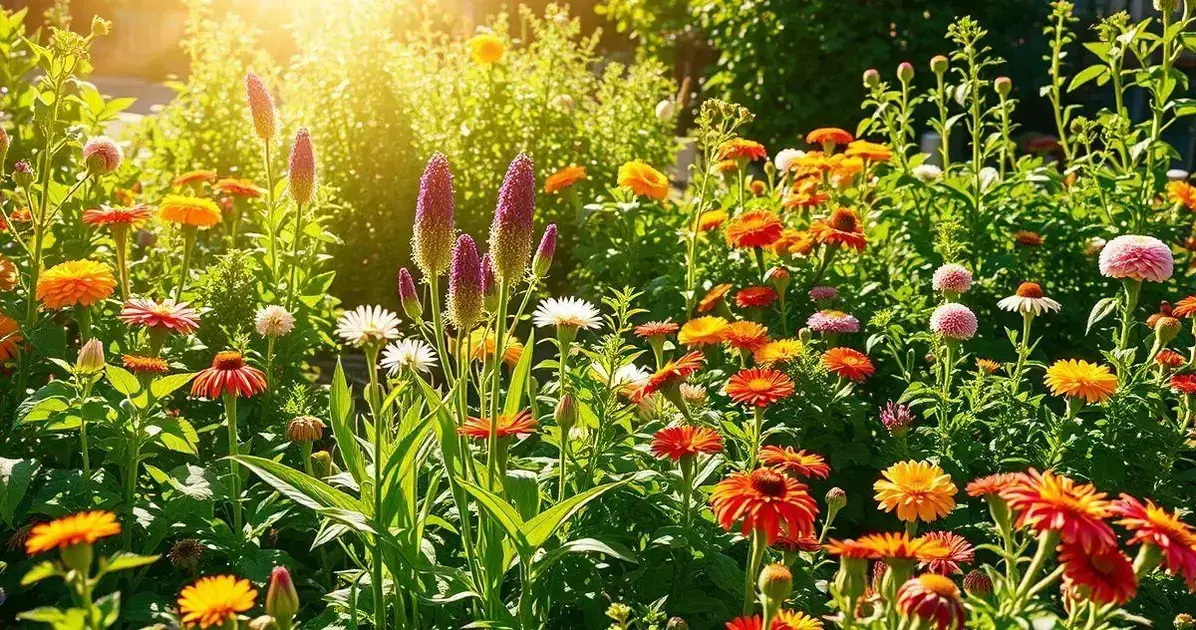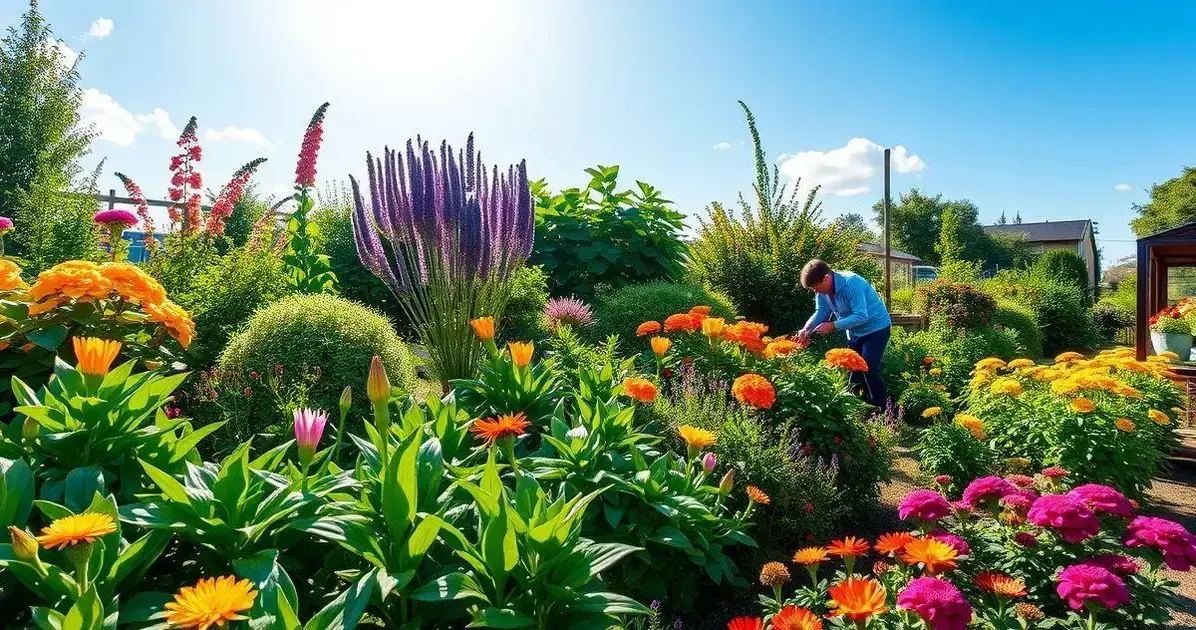Índice
Gardening tips are vital for anyone looking to cultivate a beautiful and thriving garden. From ornamental flowers to edible crops, following the right advice can make a big difference in plant growth and health.
Whether you’re a beginner or have experience, knowing essential techniques like soil selection, proper watering, and pest control will help you achieve better results. These elements are key to maintaining a healthy and productive garden.
Using gardening tips consistently can turn your green space into a vibrant and resilient environment. Keep reading to learn how to care for your plants throughout every season.
Essential Gardening Tips for Beginners
Starting a garden can be exciting and rewarding. One of the essential gardening tips for beginners is to choose the right location. Look for a spot that gets plenty of sunlight, as most plants need at least six hours of direct sunlight each day to thrive. Ensure the area has good drainage to prevent water from pooling around the roots, which can cause them to rot.
Another important tip is to select suitable plants for your climate and soil type. Beginner gardeners should start with easy-to-grow plants such as tomatoes, lettuce, or marigolds. These plants are not only resilient but also provide instant satisfaction as they flourish quickly. Research your local growing season to find the best time to plant for optimal growth.
Lastly, remember that watering plays a crucial role in plant health. It’s best to water your garden early in the morning or late in the afternoon to reduce evaporation. Aim to keep the soil evenly moist, avoiding overwatering, which can be harmful. Monitoring your plants regularly helps you catch any issues before they become serious.
How to Choose the Right Soil
Choosing the right soil is essential for healthy plants. The first step is to understand the type of soil your garden needs. A good quality garden soil typically has a mix of sand, silt, and clay. This combination ensures proper drainage while still retaining moisture. You can also look for bags of potting mix if you’re planting in containers, as these are specially formulated to promote growth.
Another important factor is the soil’s pH level. Most plants thrive in slightly acidic to neutral soil, which has a pH between 6.0 and 7.0. You can easily check the pH of your soil with a home testing kit from a garden store. If the soil is too acidic or alkaline, you can amend it by adding lime to raise pH or sulfur to lower it, helping create an ideal growing environment.
Don’t forget about organic matter, which is crucial for soil health. Adding compost or well-rotted manure can vastly improve soil structure and nutrient content. This organic material boosts beneficial microorganisms and provides essential nutrients. When choosing soil, remember that healthy plants start with the right foundation.
Watering Techniques for Healthy Plants
Watering your plants properly is key to keeping them healthy. One of the best watering techniques is to water deeply but less frequently. This encourages roots to grow deeper, where moisture is more consistent. Aim for about one inch of water per week, whether from rain or your tap. You can check the soil with your fingers; if it feels dry two inches down, it’s time to water.
Another effective technique is to use a watering can or a soaker hose instead of a sprinkler. These methods provide water directly to the roots without splashing onto the leaves. Wet leaves can lead to diseases, such as mildew and rot. Plus, targeted watering helps conserve water by delivering it directly to where it’s needed the most.
Lastly, consider the time of day you water your plants. Early morning is the best time to water because it allows the plants to absorb moisture before the sun gets too hot. Watering in the morning prevents evaporation, making sure your plants stay hydrated throughout the day. This simple change can make a big difference in how your plants grow.
The Importance of Sunlight in Gardening

Sunlight is one of the most important factors for successful gardening. Plants use sunlight to make their food through a process called photosynthesis. This process helps them grow strong and healthy. Without enough sunlight, plants can become weak, unable to produce flowers or fruit. That’s why understanding how much sunlight your garden gets is vital for your plants’ growth.
Different plants require different amounts of sunlight. Some need full sun, which means they should get at least six hours of direct sunlight each day. Others thrive in partial shade. Before planting, check the sunlight conditions in your garden to choose the right plants. By matching plants to their sunlight needs, you can create a vibrant and successful garden.
In addition to promoting growth, sunlight can also improve the quality of your produce. Fruits and vegetables that get plenty of sunlight often have better flavour and are more nutritious. To enhance your garden’s productivity, arrange your plants with taller ones at the back and shorter ones at the front, ensuring that every plant gets the amount of sunlight it needs.
Ideas for Pest Management
Pest management is an essential part of gardening that helps ensure your plants remain healthy. One effective idea for pest control is to attract beneficial insects to your garden. Ladybugs and lacewings are natural predators of harmful pests like aphids. You can encourage these helpful insects by planting flowers such as marigolds and daisies. These gardening tips not only manage pests but also promote biodiversity in your garden.
Another useful approach is to use natural repellents. For example, a mixture of water and a few drops of dish soap can be sprayed on plants to deter pests without harming them. Additionally, planting certain herbs like basil and mint can naturally repel insects due to their strong scents. These eco-friendly gardening tips help protect your plants without the need for harsh chemicals.
Finally, keeping your garden clean is vital for pest management. Remove dead plants or debris where pests might hide, and rotate crops each season to prevent infestations. By following these smart gardening tips, you’ll maintain a healthier, more resilient garden all year round.
Seasonal Gardening Tips
Each season brings unique opportunities for gardening. In the spring, it’s essential to prepare your garden for planting. Clear out old debris and enrich the soil with compost. This is also a great time to plant seeds for herbs and vegetables like lettuce, carrots, and peas. These early-season gardening tips help lay a strong foundation for growth.
During the summer, focus on watering and mulching. With the heat, plants can become stressed if they lack moisture. Water early in the morning and use mulch to retain soil moisture. Summer is also ideal for checking for pests and diseases. Applying these gardening tips will keep your plants healthy and thriving.
As autumn arrives, start harvesting crops and clearing out old plants. Consider planting winter crops like garlic or kale, which handle the cold well. Adding mulch can protect roots from low temperatures. These seasonal gardening tips will help keep your garden strong through the colder months.
Check out our article on Legacy Lifestyle to discover how to build lasting impact and create wealth that transcends generations.
